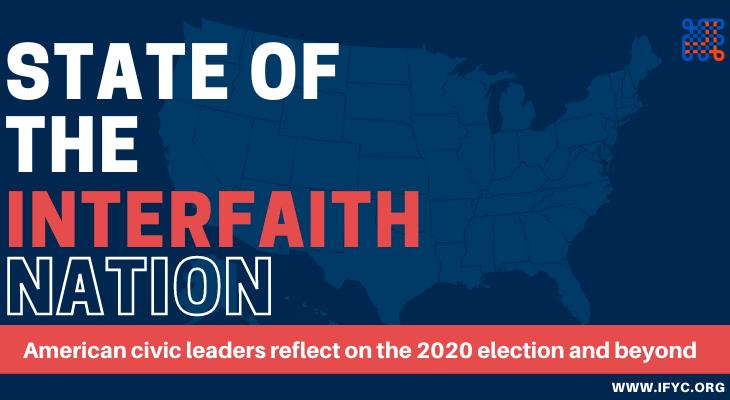The State of the Interfaith Nation
January 6, 2021

The turn of the year and the presidential transition brings the spirit of forward momentum. As we begin to navigate our changing reality as a country, it is also necessary to pause and take stock. For those of us committed to the American project, what has the past year taught us about who we are, and who we might become? What did we learn from the 2020 election? How do we think about the future of our religiously diverse democracy in this transitional time?
There are many true things we can say about this American moment: we are a nation in crisis. We are a nation wracked by grief as a historic pandemic rages on. We are in the grips of a long-overdue racial reckoning. We are rapidly diversifying. Our trust in institutions and each other is declining. We are deeply, deeply divided.
Yet, in every one of the big stories of this past year – the Covid crisis and the health and economic devastation that it wrought, the election of Joe Biden and Kamala Harris, the racial reckoning – interfaith cooperation was present.
A typical hospital in the United States has a Muslim doctor working with a Jewish respiratory therapist supported by a Hindu nurse in a room sanitized by a Buddhist at an institution founded by a Catholic religious order whose CEO is a secular humanist who grew up Lutheran. The fact that this interfaith cooperation happens every day in virtually every health care facility in the United States does not make it any less remarkable for being so common. It’s the kind of interfaith cooperation that saves lives.
Here is another way that the efforts of people from a range of religious communities keep people alive: the volunteering of diverse faith communities that supports social services like food depositories and grocery deliveries. Over 2/3 of the volunteers and food distribution sites associated with the Greater Chicagoland Food Depository are diverse faith groups.
Diverse religious groups were also front and center in the racial reckoning of the summer. The thousands of people who flooded our nation’s streets were also a cross-section of America’s religious diversity. Sikh and secular, Baptist and Buddhist – a coalition of religiously and ethically motivated individuals showed their solidarity in protest and advocacy. Even the Mennonite Church spoke out about the essential need for racial justice to truly achieve peace. As was the case in the civil rights movements of the 1960s and 1970s, interfaith collaborators fuel the movement for racial justice today.
The White House will soon be a reflection of this kind of interfaith cooperation. Joe Biden is only the second Catholic to be elected to the nation’s highest office. The fact that he referred to his Catholic faith often, and that it was broadly viewed as a benefit to his candidacy, shows just how far America has come from its anti-Catholic past. Kamala Harris has her own inspiring story of religious diversity. She grew up with a Hindu mother, attending a Black Baptist church with a friend, and is now married to a Jewish man. Biden and Harris’s religious values and belief in interfaith relationships have been on full display in the inclusive nature of their campaign.
How will the momentum from this interfaith cooperation carry us forward into 2021? What is the state of our interfaith nation, as we turn the page to a new year and a new presidential administration?
A diversity of perspectives is necessary to illuminate these types of complex questions without simple answers. When there is no obvious or conclusive response, a range of diverse viewpoints – from different racial, ideological, religious, and class backgrounds – can shed light on new insights and collectively shape a path forward into a new era.
Over the course of the next two weeks, we are honored to share with you over 15 essays as a part of a series we call The State of the Interfaith Nation. Our own reflection on the post-election moment inspired us to reach out to our network and ask how they were thinking about our interfaith America in this transition time between administrations. We asked a set of our respected colleagues to give us their honest assessment of where America is after the 2020 election and help vision a way forward in the midst of our deep divisions. We hope that these reflections, from a diverse cross-section of American civic leaders, will help us better understand our work in building a strong, religiously diverse democracy.
Taken together, we hope that this series will spark new insights, generate discussion in our virtual communities, and re-invigorate our commitment to strengthening our democracy. Above all, building interfaith America requires our collective passion – we hope that these pieces will fuel your passion for this work as they have for us.
We are truly thrilled to bring you pieces from the following exemplary leaders:
Please stay connected as this series is released and join in this conversation yourself online!
Share
Related Articles
American Civic Life
American Civic Life
Higher Education
Interfaith America Debuts Certificate Course in Interfaith Leadership



